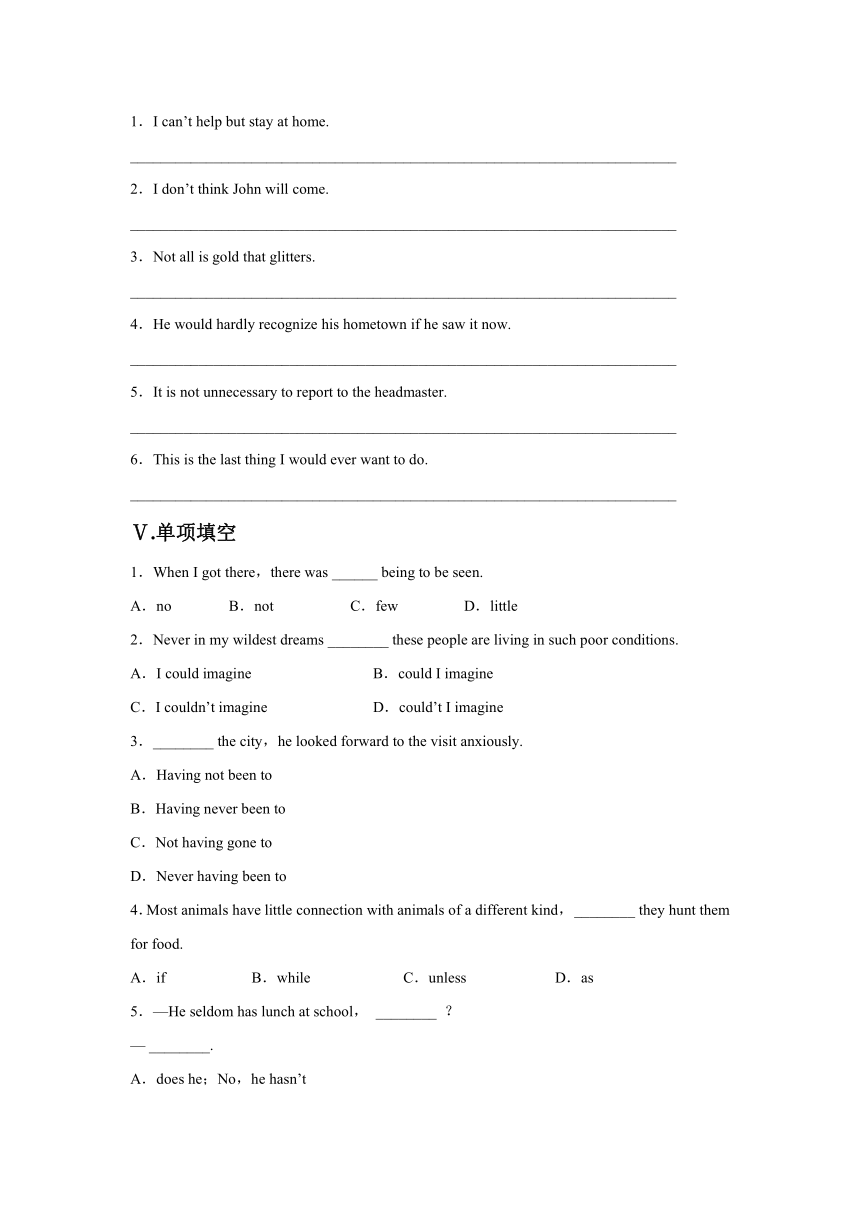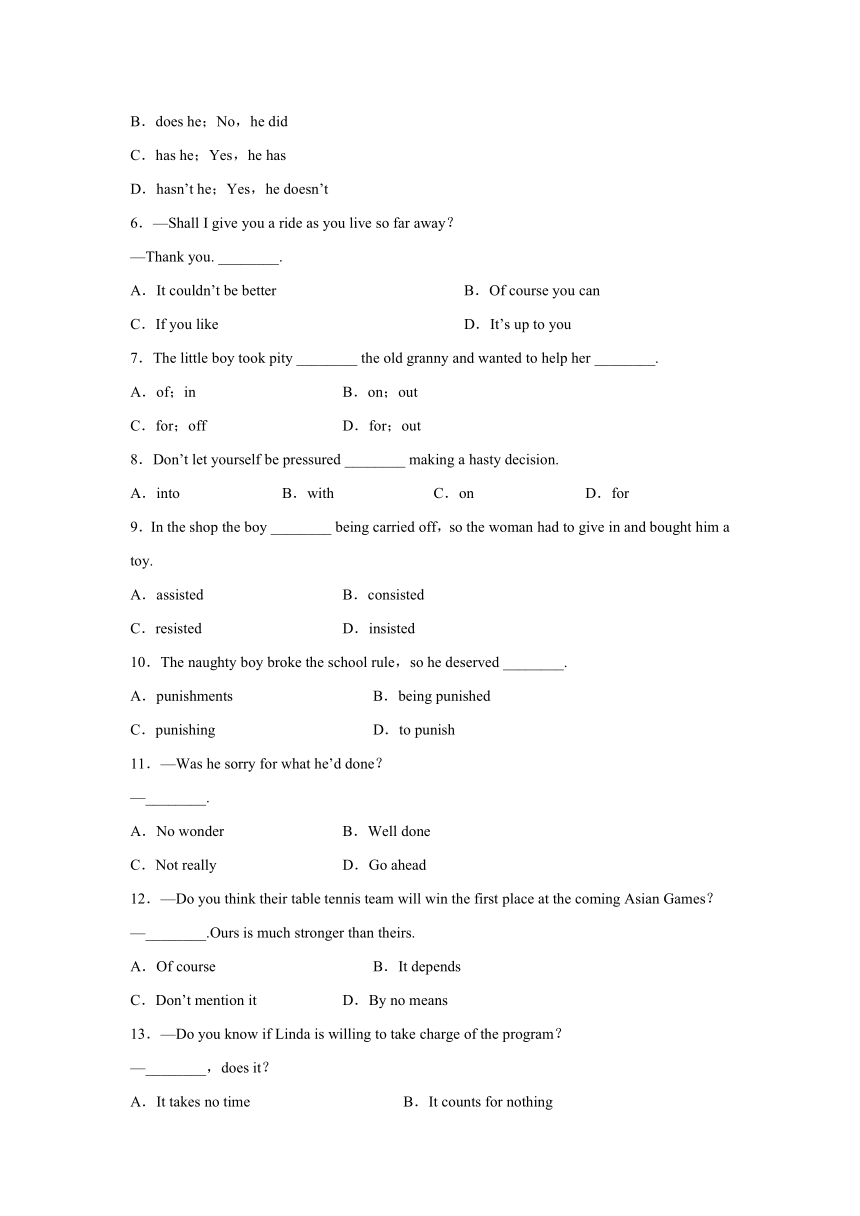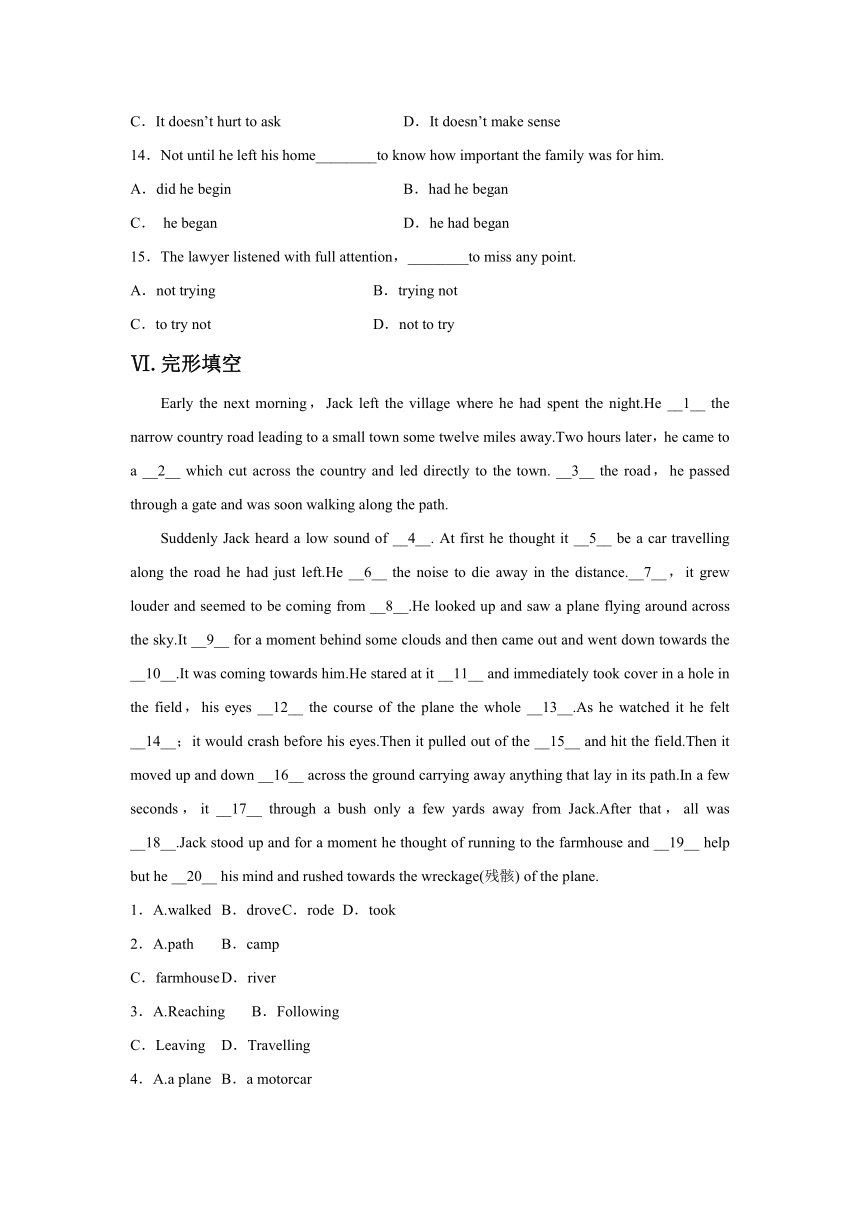Unit 1 The written word 同步练习2(含答案)
文档属性
| 名称 | Unit 1 The written word 同步练习2(含答案) |

|
|
| 格式 | zip | ||
| 文件大小 | 19.8KB | ||
| 资源类型 | 教案 | ||
| 版本资源 | 牛津译林版 | ||
| 科目 | 英语 | ||
| 更新时间 | 2016-07-04 00:00:00 | ||
图片预览




文档简介
Unit
1
The
written
word
同步练习
Ⅰ.单词拼写
1.The
curriculum
was
too
narrow
and
too
________
(死板的).
2.Some
young
people
are
__________
(迫使)
into
staying
on
at
school.
3.The
________
(暴行)
shown
on
the
TV
should
be
stopped.
4.We
mustn’t
________
(滥用)
the
natural
materials.
5.The
government
must
take
measures
to
make
a
______
(改革)
about
the
laws.
6.Last
night
she
was
__________
(团聚)
with
her
family.
7.He
suffered
great
____________
(不幸)
that
year,but
now
he
is
very
lucky.
8.A
healthy
body
can
__________
(抵抗)
common
diseases.
Ⅱ.选词填空
1.You’ll
______________
if
you
don’t
pay
the
rent.
2.The
newly
opened
company
is
____________________
the
government.
3.As
students,we
should
________________
studying
not
playing.
4.You
could
________________
for
doing
that.
5.Looking
at
all
the
accusing
faces,she
felt
a
sudden
urge
to
______________.
6.The
house
was
______________
flats.
Ⅲ.同义词辨析
1.用raise/rise的适当形式填空
(1)The
sun
________
in
the
east.
(2)Have
you
________
the
wages?
(3)The
wounded
man
fell
and
was
too
weak
to
______.
2.用treat/cure/heal的适当形式填空
(1)This
medicine
should
________
you
of
your
cold.
(2)They
________
her
for
a
broken
leg.
(3)Though
the
wound
is
________,it
is
not
______.
Ⅳ.翻译句子
1.I
can’t
help
but
stay
at
home.
________________________________________________________________________
2.I
don’t
think
John
will
come.
________________________________________________________________________
3.Not
all
is
gold
that
glitters.
________________________________________________________________________
4.He
would
hardly
recognize
his
hometown
if
he
saw
it
now.
________________________________________________________________________
5.It
is
not
unnecessary
to
report
to
the
headmaster.
________________________________________________________________________
6.This
is
the
last
thing
I
would
ever
want
to
do.
________________________________________________________________________
Ⅴ.单项填空
1.When
I
got
there,there
was
______
being
to
be
seen.
A.no
B.not
C.few
D.little
2.Never
in
my
wildest
dreams
________
these
people
are
living
in
such
poor
conditions.
A.I
could
imagine
B.could
I
imagine
C.I
couldn’t
imagine
D.could’t
I
imagine
3.________
the
city,he
looked
forward
to
the
visit
anxiously.
A.Having
not
been
to
B.Having
never
been
to
C.Not
having
gone
to
D.Never
having
been
to
4.Most
animals
have
little
connection
with
animals
of
a
different
kind,
________
they
hunt
them
for
food.
A.if
B.while
C.unless
D.as
5.—He
seldom
has
lunch
at
school,
________
?
—
________.
A.does
he;No,he
hasn’t
B.does
he;No,he
did
C.has
he;Yes,he
has
D.hasn’t
he;Yes,he
doesn’t
6.—Shall
I
give
you
a
ride
as
you
live
so
far
away?
—Thank
you.
________.
A.It
couldn’t
be
better
B.Of
course
you
can
C.If
you
like
D.It’s
up
to
you
7.The
little
boy
took
pity
________
the
old
granny
and
wanted
to
help
her
________.
A.of;in
B.on;out
C.for;off
D.for;out
8.Don’t
let
yourself
be
pressured
________
making
a
hasty
decision.
A.into
B.with
C.on
D.for
9.In
the
shop
the
boy
________
being
carried
off,so
the
woman
had
to
give
in
and
bought
him
a
toy.
A.assisted
B.consisted
C.resisted
D.insisted
10.The
naughty
boy
broke
the
school
rule,so
he
deserved
________.
A.punishments
B.being
punished
C.punishing
D.to
punish
11.—Was
he
sorry
for
what
he’d
done?
—________.
A.No
wonder
B.Well
done
C.Not
really
D.Go
ahead
12.—Do
you
think
their
table
tennis
team
will
win
the
first
place
at
the
coming
Asian
Games?
—________.Ours
is
much
stronger
than
theirs.
A.Of
course
B.It
depends
C.Don’t
mention
it
D.By
no
means
13.—Do
you
know
if
Linda
is
willing
to
take
charge
of
the
program?
—________,does
it?
A.It
takes
no
time
B.It
counts
for
nothing
C.It
doesn’t
hurt
to
ask
D.It
doesn’t
make
sense
14.Not
until
he
left
his
home________to
know
how
important
the
family
was
for
him.
A.did
he
begin
B.had
he
began
C.
he
began
D.he
had
began
15.The
lawyer
listened
with
full
attention,________to
miss
any
point.
A.not
trying
B.trying
not
C.to
try
not
D.not
to
try
Ⅵ.完形填空
Early
the
next
morning,Jack
left
the
village
where
he
had
spent
the
night.He
__1__
the
narrow
country
road
leading
to
a
small
town
some
twelve
miles
away.Two
hours
later,he
came
to
a
__2__
which
cut
across
the
country
and
led
directly
to
the
town.
__3__
the
road,he
passed
through
a
gate
and
was
soon
walking
along
the
path.
Suddenly
Jack
heard
a
low
sound
of
__4__.
At
first
he
thought
it
__5__
be
a
car
travelling
along
the
road
he
had
just
left.He
__6__
the
noise
to
die
away
in
the
distance.__7__,it
grew
louder
and
seemed
to
be
coming
from
__8__.He
looked
up
and
saw
a
plane
flying
around
across
the
sky.It
__9__
for
a
moment
behind
some
clouds
and
then
came
out
and
went
down
towards
the
__10__.It
was
coming
towards
him.He
stared
at
it
__11__
and
immediately
took
cover
in
a
hole
in
the
field,his
eyes
__12__
the
course
of
the
plane
the
whole
__13__.As
he
watched
it
he
felt
__14__;it
would
crash
before
his
eyes.Then
it
pulled
out
of
the
__15__
and
hit
the
field.Then
it
moved
up
and
down
__16__
across
the
ground
carrying
away
anything
that
lay
in
its
path.In
a
few
seconds,it
__17__
through
a
bush
only
a
few
yards
away
from
Jack.After
that,all
was
__18__.Jack
stood
up
and
for
a
moment
he
thought
of
running
to
the
farmhouse
and
__19__
help
but
he
__20__
his
mind
and
rushed
towards
the
wreckage(残骸)
of
the
plane.
1.A.walked
B.drove
C.rode
D.took
2.A.path
B.camp
C.farmhouse
D.river
3.A.Reaching
B.Following
C.Leaving
D.Travelling
4.A.a
plane
B.a
motorcar
C.a
tractor
D.an
engine
5.A.could
B.must
C.should
D.would
6.A.ordered
B.preferred
C.tried
D.expected
7.A.Therefore
B.However
C.Otherwise
D.Thus
8.A.behind
B.above
C.ahead
D.somewhere
9.A.floated
B.rose
C.appeared
D.disappeared
10.A.field
B.village
C.country
D.shade
11.A.satisfied
B.terrified
C.disappointed
D.excited
12.A.glancing
at
B.looking
up
C.following
D.catching
13.A.morning
B.way
C.day
D.time
14.A.lonely
B.calm
C.uncertain
D.nervous
15.A.flight
B.dive
C.plane
D.sky
16.A.safely
B.quickly
C.wildly
D.widely
17.A.crashed
B.took
off
C.landed
on
D.injured
18.A.ready
B.done
C.past
D.still
19.A.turning
to
B.asking
for
C.searching
for
D.sticking
to
20.A.gave
up
B.searched
C.made
D.changed
句型公式
否定陈述特殊结构
1.not
necessarily未必
Having
money
doesn’t
necessarily
mean
happiness.
有钱未必意味着幸福。
2.too...to...太……而不能……
The
box
is
too
heavy
for
the
boy
to
carry.
箱子太重了,这个男孩搬不动。
3.the
last+n.+to
do/that
clause
……最不可能
He
is
the
last
man
to
tell
a
lie.
他是最不可能说谎的人。
4.can
not/never...too...再……也不为过
You
cannot
be
too
careful
to
cross
the
street.
过街时,你再怎么小心也不为过。
5.cannot
but
do=cannot
choose
but
do=cannot
help
but
do不得不
I
cannot
help
but
give
in.我不得不让步。
6.nothing
but仅仅,只
There
is
nothing
but
a
bed
here.
这儿只有一张床。
7.cannot
wait
to
do
sth.相当于be
eager
to
do
sth.,意为“急于做某事”
I
can’t
wait
to
read
the
book.
我非常渴望读这本书。
8.cannot
help
doing
sth.禁不住做某事
Upon
seeing
his
mother,the
baby
couldn’t
help
laughing.一看见妈妈,这孩子就情不自禁地笑了。
Period
Three Word
power
&
Grammar
and
usage
Ⅰ.1.rigid 2.pressured 3.violence 4.abuse 5.reform 6.reunited 7.misfortune 8.resist
Ⅱ.1.be
thrown
out 2.under
the
control
of 3.focus
on 4.get
arrested 5.run
away 6.divided
into
Ⅲ.1.(1)rises (2)raised (3)rise
[(1)raise是及物动词,意为“举起,抬起;提高;增高”等。
(2)rise(rose;risen)是不及物动词,意为“上升,升起;上涨;起床”等,用途广泛。]
2.(1)cure (2)treated (3)cured healed
[(1)treat强调“治疗”,常与for搭配。
(2)cure强调“对症下药,治对,治好”,常与of搭配。
(3)heal强调“治愈,完全康复”,常与of搭配。]
Ⅳ.1.我只得待在家里。
2.我认为约翰不会来。
3.发光的并非都是金子。
4.如果他现在看到他的家乡,他很难认出来。
5.有必要向校长汇报一下。
6.这是我最不愿意做的事。
Ⅴ.1.A [being
n.
生物,人。no是形容词,修饰名词;not后需加a,an,any之类的词再接名词;few后接可数名词复数;little修饰不可数名词。]
2.B [表否定意义的词与短语,如never,hardly,seldom,little,few,by
no
means,at
no
time等置于句首时,主句部分使用倒装语序。]
3.B [非谓语的否定形式在前面加not,即not
having
been
to,但用never表示否定时应为having
never
been
to。]
4.C [句意为:大部分动物与其它种类的动物没有多大联系,除非它们猎取其它动物作为食物。unless除非;如果不。]
5.A [seldom为否定词,附加疑问句用肯定形式。have
lunch中的have表示“吃”,其否定或疑问形式应用助动词;第二空中的No,he
hasn’t意为“是的,他很少在学校吃”。]
6.A [can’t
与比较级搭配,意为“再……不过,非常……”。It
could’t
be
better.意为“那再好不过了。”]
7.B [考查词语的搭配。表示“对某人同情”,若用take/have
pity时搭配的介词是on;help
sb.out帮某人摆脱困境;help
sb.off帮某人脱衣服。]
8.A [pressure
sb.into
doing
sth.迫使某人做某事。]
9.C [考查动词辨析。resist
being
carried
off拒绝被带走,符合句意。assist帮助;consist组成;insist坚持。]
10.C [A项不应使用复数形式;B项中应改成不定式的被动式。deserve后接动名词表示被动含义,若接不定式则要用被动形式才能表示被动含义。]
11.C [问句句意为:——他对他的行为表示歉意了吗?no
wonder难怪;well
done做得好;not
really常用于否定句中减弱语气,在此处表示“没怎么道歉”;go
ahead说吧,做吧。]
12.D [句意为:——你认为他们的乒乓球队在即将到来的亚运会上会获得第一名吗?——决不会。我们队比他们队要强大得多。of
course当然可以;it
depends看情况而定;don’t
mention
it别客气;by
no
means决不。由句意知选D项。]
13.C [句意为:——你知道琳达是否愿意负责这个节目吗?——我们应该问问,不是吗?根据句意应选C项。]
14.A [句意为:直到他离开了家时他才意识到家对他来说是多么重要。not
until置于句首修饰时间状语(从句)时,应把主句进行部分倒装。由left一词可知应用一般过去时态。]
15.B [句意为:律师全神贯注地听着,尽量不漏掉任何一个要点。空格处应是伴随状语,与主句动作listen同时发生,应用现在分词形式,排除C、D两项;A项是现在分词trying的否定形式,意为“不努力……”;B项意为“努力不……”。由句意知选B项。]
Ⅵ.1.D [take...road/way意为“走……条路”。]
2.A [由第一段最后一句中的“walking
along
the
path”可知选A项。]
3.C [既然下文说Jack走在小路上,那他一定是离开/放弃乡间大道,走上小路,因此选C项。]
4.D [下文说他听到声音以后,首先以为是汽车,但是声音越来越大,他抬头看见了飞机,这两者的声音的相同之处是engine(发动机)的声音。]
5.B [与下文联系起来考虑,下文说Jack没有理会这些,心想它会慢慢消失在远方,可见他认定这是小汽车的声音。could在此语气太弱,与下文不符。]
6.D [expect
the
noise
to
die
away
in
the
distance表示“期待/预料这噪音会慢慢消失在远方”。]
7.B [由下文的“声音越来越大”与上文“心想这噪音会慢慢消失”可知此处是用however引出与前面相反的描述。]
8.B [“声音越来越大,好像来自头顶”,于是有了下文的“他抬起头向上看”。]
9.D [有一会儿飞机消失(disappear)在云彩后面,然后又飞出来。]
10.A [从上下文看,故事发生在乡间小路上,而下文又多次提到in
the
field,飞机最后hit
the
field,因此选A项。]
11.B [用形容词作状语表示主语的伴随状况,“他惊恐万分地看着飞机”,后文说他连忙躲起来了。]
12.C [follow追随,跟随。他躲在洞里,眼睛一刻也没有离开飞机,追随着飞机的航行。]
13.D [the
whole
time或all
the
time表示时间,意为“自始至终”;all
the
way
表示路程,意为“一路上”,因此选D项。]
14.D [“飞机会在他眼前爆炸”,任何人目睹这一幕都会感到紧张害怕,而不是“孤独”,“冷静”和“不确定”。]
15.B [根据下文的描述,飞机不是一头栽倒在田里,而是在田里滑行了一段距离,因此用dive。]
16.C [飞机一下子落到地里,在地里上下颠簸,向前冲去,把一路上的东西铲掉了,这种描写给人的感觉,只能是wildly(疯狂地)。]
17.A [crash(飞机等)坠毁,撞坏。从此处可以看出,飞机不是起飞(take
off),也不是在树林里着陆(land
on),而是在一片丛林中坠毁了。]
18.D [all
was
still意为“一切都凝固了”。空难之后一刹那,好像连空气都凝固了,Jack也愣住了,不知该怎么办。]
19.B [ask
for
help求援。]
20.D [本想去搬救兵,此时改变了主意。change
one’s
mind改变某人的主意。]
1
The
written
word
同步练习
Ⅰ.单词拼写
1.The
curriculum
was
too
narrow
and
too
________
(死板的).
2.Some
young
people
are
__________
(迫使)
into
staying
on
at
school.
3.The
________
(暴行)
shown
on
the
TV
should
be
stopped.
4.We
mustn’t
________
(滥用)
the
natural
materials.
5.The
government
must
take
measures
to
make
a
______
(改革)
about
the
laws.
6.Last
night
she
was
__________
(团聚)
with
her
family.
7.He
suffered
great
____________
(不幸)
that
year,but
now
he
is
very
lucky.
8.A
healthy
body
can
__________
(抵抗)
common
diseases.
Ⅱ.选词填空
1.You’ll
______________
if
you
don’t
pay
the
rent.
2.The
newly
opened
company
is
____________________
the
government.
3.As
students,we
should
________________
studying
not
playing.
4.You
could
________________
for
doing
that.
5.Looking
at
all
the
accusing
faces,she
felt
a
sudden
urge
to
______________.
6.The
house
was
______________
flats.
Ⅲ.同义词辨析
1.用raise/rise的适当形式填空
(1)The
sun
________
in
the
east.
(2)Have
you
________
the
wages?
(3)The
wounded
man
fell
and
was
too
weak
to
______.
2.用treat/cure/heal的适当形式填空
(1)This
medicine
should
________
you
of
your
cold.
(2)They
________
her
for
a
broken
leg.
(3)Though
the
wound
is
________,it
is
not
______.
Ⅳ.翻译句子
1.I
can’t
help
but
stay
at
home.
________________________________________________________________________
2.I
don’t
think
John
will
come.
________________________________________________________________________
3.Not
all
is
gold
that
glitters.
________________________________________________________________________
4.He
would
hardly
recognize
his
hometown
if
he
saw
it
now.
________________________________________________________________________
5.It
is
not
unnecessary
to
report
to
the
headmaster.
________________________________________________________________________
6.This
is
the
last
thing
I
would
ever
want
to
do.
________________________________________________________________________
Ⅴ.单项填空
1.When
I
got
there,there
was
______
being
to
be
seen.
A.no
B.not
C.few
D.little
2.Never
in
my
wildest
dreams
________
these
people
are
living
in
such
poor
conditions.
A.I
could
imagine
B.could
I
imagine
C.I
couldn’t
imagine
D.could’t
I
imagine
3.________
the
city,he
looked
forward
to
the
visit
anxiously.
A.Having
not
been
to
B.Having
never
been
to
C.Not
having
gone
to
D.Never
having
been
to
4.Most
animals
have
little
connection
with
animals
of
a
different
kind,
________
they
hunt
them
for
food.
A.if
B.while
C.unless
D.as
5.—He
seldom
has
lunch
at
school,
________
?
—
________.
A.does
he;No,he
hasn’t
B.does
he;No,he
did
C.has
he;Yes,he
has
D.hasn’t
he;Yes,he
doesn’t
6.—Shall
I
give
you
a
ride
as
you
live
so
far
away?
—Thank
you.
________.
A.It
couldn’t
be
better
B.Of
course
you
can
C.If
you
like
D.It’s
up
to
you
7.The
little
boy
took
pity
________
the
old
granny
and
wanted
to
help
her
________.
A.of;in
B.on;out
C.for;off
D.for;out
8.Don’t
let
yourself
be
pressured
________
making
a
hasty
decision.
A.into
B.with
C.on
D.for
9.In
the
shop
the
boy
________
being
carried
off,so
the
woman
had
to
give
in
and
bought
him
a
toy.
A.assisted
B.consisted
C.resisted
D.insisted
10.The
naughty
boy
broke
the
school
rule,so
he
deserved
________.
A.punishments
B.being
punished
C.punishing
D.to
punish
11.—Was
he
sorry
for
what
he’d
done?
—________.
A.No
wonder
B.Well
done
C.Not
really
D.Go
ahead
12.—Do
you
think
their
table
tennis
team
will
win
the
first
place
at
the
coming
Asian
Games?
—________.Ours
is
much
stronger
than
theirs.
A.Of
course
B.It
depends
C.Don’t
mention
it
D.By
no
means
13.—Do
you
know
if
Linda
is
willing
to
take
charge
of
the
program?
—________,does
it?
A.It
takes
no
time
B.It
counts
for
nothing
C.It
doesn’t
hurt
to
ask
D.It
doesn’t
make
sense
14.Not
until
he
left
his
home________to
know
how
important
the
family
was
for
him.
A.did
he
begin
B.had
he
began
C.
he
began
D.he
had
began
15.The
lawyer
listened
with
full
attention,________to
miss
any
point.
A.not
trying
B.trying
not
C.to
try
not
D.not
to
try
Ⅵ.完形填空
Early
the
next
morning,Jack
left
the
village
where
he
had
spent
the
night.He
__1__
the
narrow
country
road
leading
to
a
small
town
some
twelve
miles
away.Two
hours
later,he
came
to
a
__2__
which
cut
across
the
country
and
led
directly
to
the
town.
__3__
the
road,he
passed
through
a
gate
and
was
soon
walking
along
the
path.
Suddenly
Jack
heard
a
low
sound
of
__4__.
At
first
he
thought
it
__5__
be
a
car
travelling
along
the
road
he
had
just
left.He
__6__
the
noise
to
die
away
in
the
distance.__7__,it
grew
louder
and
seemed
to
be
coming
from
__8__.He
looked
up
and
saw
a
plane
flying
around
across
the
sky.It
__9__
for
a
moment
behind
some
clouds
and
then
came
out
and
went
down
towards
the
__10__.It
was
coming
towards
him.He
stared
at
it
__11__
and
immediately
took
cover
in
a
hole
in
the
field,his
eyes
__12__
the
course
of
the
plane
the
whole
__13__.As
he
watched
it
he
felt
__14__;it
would
crash
before
his
eyes.Then
it
pulled
out
of
the
__15__
and
hit
the
field.Then
it
moved
up
and
down
__16__
across
the
ground
carrying
away
anything
that
lay
in
its
path.In
a
few
seconds,it
__17__
through
a
bush
only
a
few
yards
away
from
Jack.After
that,all
was
__18__.Jack
stood
up
and
for
a
moment
he
thought
of
running
to
the
farmhouse
and
__19__
help
but
he
__20__
his
mind
and
rushed
towards
the
wreckage(残骸)
of
the
plane.
1.A.walked
B.drove
C.rode
D.took
2.A.path
B.camp
C.farmhouse
D.river
3.A.Reaching
B.Following
C.Leaving
D.Travelling
4.A.a
plane
B.a
motorcar
C.a
tractor
D.an
engine
5.A.could
B.must
C.should
D.would
6.A.ordered
B.preferred
C.tried
D.expected
7.A.Therefore
B.However
C.Otherwise
D.Thus
8.A.behind
B.above
C.ahead
D.somewhere
9.A.floated
B.rose
C.appeared
D.disappeared
10.A.field
B.village
C.country
D.shade
11.A.satisfied
B.terrified
C.disappointed
D.excited
12.A.glancing
at
B.looking
up
C.following
D.catching
13.A.morning
B.way
C.day
D.time
14.A.lonely
B.calm
C.uncertain
D.nervous
15.A.flight
B.dive
C.plane
D.sky
16.A.safely
B.quickly
C.wildly
D.widely
17.A.crashed
B.took
off
C.landed
on
D.injured
18.A.ready
B.done
C.past
D.still
19.A.turning
to
B.asking
for
C.searching
for
D.sticking
to
20.A.gave
up
B.searched
C.made
D.changed
句型公式
否定陈述特殊结构
1.not
necessarily未必
Having
money
doesn’t
necessarily
mean
happiness.
有钱未必意味着幸福。
2.too...to...太……而不能……
The
box
is
too
heavy
for
the
boy
to
carry.
箱子太重了,这个男孩搬不动。
3.the
last+n.+to
do/that
clause
……最不可能
He
is
the
last
man
to
tell
a
lie.
他是最不可能说谎的人。
4.can
not/never...too...再……也不为过
You
cannot
be
too
careful
to
cross
the
street.
过街时,你再怎么小心也不为过。
5.cannot
but
do=cannot
choose
but
do=cannot
help
but
do不得不
I
cannot
help
but
give
in.我不得不让步。
6.nothing
but仅仅,只
There
is
nothing
but
a
bed
here.
这儿只有一张床。
7.cannot
wait
to
do
sth.相当于be
eager
to
do
sth.,意为“急于做某事”
I
can’t
wait
to
read
the
book.
我非常渴望读这本书。
8.cannot
help
doing
sth.禁不住做某事
Upon
seeing
his
mother,the
baby
couldn’t
help
laughing.一看见妈妈,这孩子就情不自禁地笑了。
Period
Three Word
power
&
Grammar
and
usage
Ⅰ.1.rigid 2.pressured 3.violence 4.abuse 5.reform 6.reunited 7.misfortune 8.resist
Ⅱ.1.be
thrown
out 2.under
the
control
of 3.focus
on 4.get
arrested 5.run
away 6.divided
into
Ⅲ.1.(1)rises (2)raised (3)rise
[(1)raise是及物动词,意为“举起,抬起;提高;增高”等。
(2)rise(rose;risen)是不及物动词,意为“上升,升起;上涨;起床”等,用途广泛。]
2.(1)cure (2)treated (3)cured healed
[(1)treat强调“治疗”,常与for搭配。
(2)cure强调“对症下药,治对,治好”,常与of搭配。
(3)heal强调“治愈,完全康复”,常与of搭配。]
Ⅳ.1.我只得待在家里。
2.我认为约翰不会来。
3.发光的并非都是金子。
4.如果他现在看到他的家乡,他很难认出来。
5.有必要向校长汇报一下。
6.这是我最不愿意做的事。
Ⅴ.1.A [being
n.
生物,人。no是形容词,修饰名词;not后需加a,an,any之类的词再接名词;few后接可数名词复数;little修饰不可数名词。]
2.B [表否定意义的词与短语,如never,hardly,seldom,little,few,by
no
means,at
no
time等置于句首时,主句部分使用倒装语序。]
3.B [非谓语的否定形式在前面加not,即not
having
been
to,但用never表示否定时应为having
never
been
to。]
4.C [句意为:大部分动物与其它种类的动物没有多大联系,除非它们猎取其它动物作为食物。unless除非;如果不。]
5.A [seldom为否定词,附加疑问句用肯定形式。have
lunch中的have表示“吃”,其否定或疑问形式应用助动词;第二空中的No,he
hasn’t意为“是的,他很少在学校吃”。]
6.A [can’t
与比较级搭配,意为“再……不过,非常……”。It
could’t
be
better.意为“那再好不过了。”]
7.B [考查词语的搭配。表示“对某人同情”,若用take/have
pity时搭配的介词是on;help
sb.out帮某人摆脱困境;help
sb.off帮某人脱衣服。]
8.A [pressure
sb.into
doing
sth.迫使某人做某事。]
9.C [考查动词辨析。resist
being
carried
off拒绝被带走,符合句意。assist帮助;consist组成;insist坚持。]
10.C [A项不应使用复数形式;B项中应改成不定式的被动式。deserve后接动名词表示被动含义,若接不定式则要用被动形式才能表示被动含义。]
11.C [问句句意为:——他对他的行为表示歉意了吗?no
wonder难怪;well
done做得好;not
really常用于否定句中减弱语气,在此处表示“没怎么道歉”;go
ahead说吧,做吧。]
12.D [句意为:——你认为他们的乒乓球队在即将到来的亚运会上会获得第一名吗?——决不会。我们队比他们队要强大得多。of
course当然可以;it
depends看情况而定;don’t
mention
it别客气;by
no
means决不。由句意知选D项。]
13.C [句意为:——你知道琳达是否愿意负责这个节目吗?——我们应该问问,不是吗?根据句意应选C项。]
14.A [句意为:直到他离开了家时他才意识到家对他来说是多么重要。not
until置于句首修饰时间状语(从句)时,应把主句进行部分倒装。由left一词可知应用一般过去时态。]
15.B [句意为:律师全神贯注地听着,尽量不漏掉任何一个要点。空格处应是伴随状语,与主句动作listen同时发生,应用现在分词形式,排除C、D两项;A项是现在分词trying的否定形式,意为“不努力……”;B项意为“努力不……”。由句意知选B项。]
Ⅵ.1.D [take...road/way意为“走……条路”。]
2.A [由第一段最后一句中的“walking
along
the
path”可知选A项。]
3.C [既然下文说Jack走在小路上,那他一定是离开/放弃乡间大道,走上小路,因此选C项。]
4.D [下文说他听到声音以后,首先以为是汽车,但是声音越来越大,他抬头看见了飞机,这两者的声音的相同之处是engine(发动机)的声音。]
5.B [与下文联系起来考虑,下文说Jack没有理会这些,心想它会慢慢消失在远方,可见他认定这是小汽车的声音。could在此语气太弱,与下文不符。]
6.D [expect
the
noise
to
die
away
in
the
distance表示“期待/预料这噪音会慢慢消失在远方”。]
7.B [由下文的“声音越来越大”与上文“心想这噪音会慢慢消失”可知此处是用however引出与前面相反的描述。]
8.B [“声音越来越大,好像来自头顶”,于是有了下文的“他抬起头向上看”。]
9.D [有一会儿飞机消失(disappear)在云彩后面,然后又飞出来。]
10.A [从上下文看,故事发生在乡间小路上,而下文又多次提到in
the
field,飞机最后hit
the
field,因此选A项。]
11.B [用形容词作状语表示主语的伴随状况,“他惊恐万分地看着飞机”,后文说他连忙躲起来了。]
12.C [follow追随,跟随。他躲在洞里,眼睛一刻也没有离开飞机,追随着飞机的航行。]
13.D [the
whole
time或all
the
time表示时间,意为“自始至终”;all
the
way
表示路程,意为“一路上”,因此选D项。]
14.D [“飞机会在他眼前爆炸”,任何人目睹这一幕都会感到紧张害怕,而不是“孤独”,“冷静”和“不确定”。]
15.B [根据下文的描述,飞机不是一头栽倒在田里,而是在田里滑行了一段距离,因此用dive。]
16.C [飞机一下子落到地里,在地里上下颠簸,向前冲去,把一路上的东西铲掉了,这种描写给人的感觉,只能是wildly(疯狂地)。]
17.A [crash(飞机等)坠毁,撞坏。从此处可以看出,飞机不是起飞(take
off),也不是在树林里着陆(land
on),而是在一片丛林中坠毁了。]
18.D [all
was
still意为“一切都凝固了”。空难之后一刹那,好像连空气都凝固了,Jack也愣住了,不知该怎么办。]
19.B [ask
for
help求援。]
20.D [本想去搬救兵,此时改变了主意。change
one’s
mind改变某人的主意。]
